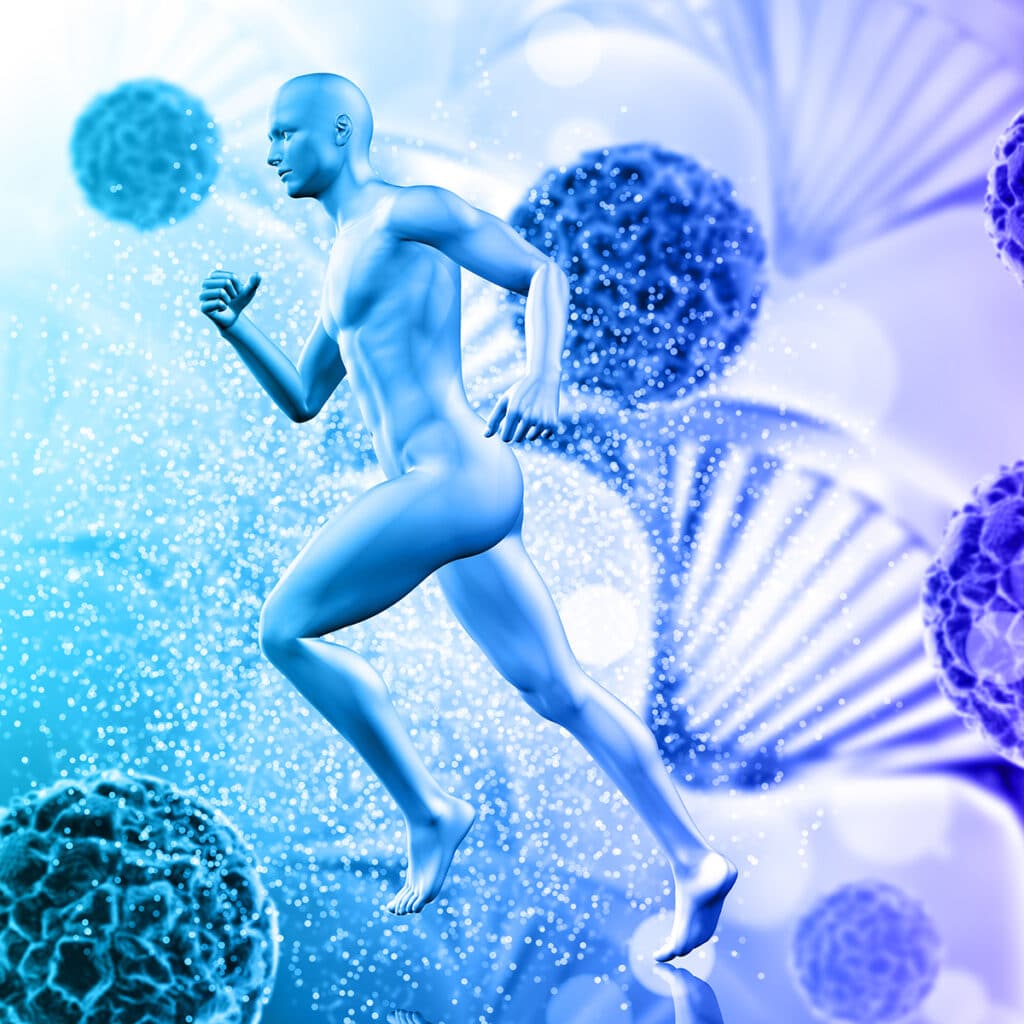What is deuterium?
In the western population, deuterium exposure is now so high that it should be an important point in anti-ageing therapy and general health care. Deuterium (D or 2H) is a simple element consisting of a proton, a neutron and an electron. It is a molecular variant (isotope) of hydrogen, but twice as heavy. And that's where the problem begins. The additional weight behaves differently to hydrogen in chemical reactions, including in the human body, so that there are far-reaching metabolic consequences when the deuterium level in the body rises.
Lower deuterium levels
Deuterium depletion is a new tool at the submolecular level to lower deuterium levels in the body. The body's ability to lower the level decreases with age, but also with little physical activity, obesity, sleep disorders or a poor immune system.
Deuterium depletion
If the deuterium level is too high because the body is not working effectively enough, you can drink low-deuterium water to dilute the total amount of deuterium. This seems to be an interesting option from the age of 30, in combination with a health-conscious lifestyle. A generally desirable deuterium concentration would be 130 ppm. Lowering the level is a natural biochemical process and is one of the normal functions of the cell. Low deuterium water can be used to lower the level, even if the physiological activity of the cells is weakened.
Hydrogen
Hydrogen is the most abundant element in the world. It is irreplaceably important for life. Hydrogen can be found in the air we breathe, in food and also in drinks. The hydrogen atoms that we absorb into our bodies become part of our blood, all our organs and our DNA. In short: hydrogen is in everything we are made of.
Deuterium
Deuterium is a very strange type of hydrogen atom that becomes part of our body just like normal hydrogen. However, unlike hydrogen, deuterium has an extra neutron, which doubles its weight. As with water, an excess of deuterium changes the chemistry of our body's "ingredients". Deuterium is found in the air, in water and in food. The amount of deuterium is expressed in parts per million (ppm) and despite these small amounts, deuterium has a significant impact on the proper functioning of our body.
Biological function
The concentration of deuterium in the human body can be many times higher than other physiologically essential elements such as calcium, potassium or magnesium. In comparison: there is 6 times more deuterium in the blood than calcium and 10 times more deuterium than magnesium. The health effects of calcium and magnesium are known and documented, even if their concentration in the blood is lower. Deuterium has therefore been somewhat less researched to date, but is an important factor that should be taken into consideration.
Deuterium in food
Plants get rid of their deuterium by storing it in their sugars. This is why carbohydrate-rich and sugary products such as
- Fruit
- Potatoes
- Cereals
- Soft drinks (and foods and drinks with a high sugar content)
rich in deuterium.
Refined foods also have a higher deuterium content. Natural foods that contain fat, such as nuts and vegetable oils, but also Chaga mushrooms have a low deuterium content. Vegetables also contain little deuterium. Tropical fruit from near the equator contains a higher concentration of deuterium than regional fruit and vegetables, for example.
Deuterium and mitochondria
The mitochondria in the cells play an important role in energy metabolism, which in turn is a key factor in general health. Each mitochondrion has hundreds of nanomotors that draw their energy from food. Hydrogen ions drive these nanomotors, together with ATP synthesis. As a hydrogen variant, deuterium also has an influence on the nanomotors, albeit a negative one. Deuterium does not drive the motors, but causes them to break. This leads to an imbalance in the energy balance.
Mitochondria produce water
The body draws water from two sources: 1. drinking water and 2. the water produced by the mitochondria. You may not have known that the body can produce water itself, but this has been scientifically proven. The deuterium content in the body is therefore a mixture of drinking water and water from the mitochondria. Different water sources have different deuterium concentrations. Drinking water and drinks that contain drinking water (e.g. soft drinks) usually have a high deuterium content.
https://theartofraw.at/chaga-analyse-an-der-tu-wien/




